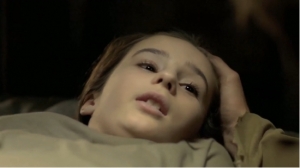On the way to Jerusalem he was passing along between Samaria and Galilee. And as he entered a village, he was met by ten lepers who stood at a distance and called out, “Jesus, Master, have mercy on us . . .” Luke 17:11-19
Remember: he’s on his way to a specific destination, though he seems to be taking a very roundabout route. And remember, when he first “set his face” to go there (Luke 9:51), his way was barred—not by Pharisees and scribes, who are his most outspoken critics, but by Samaritans, who didn’t like where he was headed. That was some time ago—no telling how long. He’s been here and there among the Galilean villages, probably even across the Jordan to spend some time among the Decapolis (Ten Cities). Soon he will cross the Jordan and head southward through Perea. From then on, his route will be more direct.
The mention of the border reminds us he wasn’t wanted in Samaria. Most of us don’t want him—until we need him.
Suppose the crowds have thinned out here. Suppose Jesus has stepped up the pace, and his followers are hurrying to keep up. They’re being watched by a party of ten, gathered “at a distance.” Suppose those ten lepers are not there by chance–they knew he was coming, and they found a favorable position, and they need to be heard.
Remember the first leper Jesus healed? “Lord, if you are willing, you can make me clean” (Luke 5:12). I am willing, he replied. Of course he is. He touched that one; he doesn’t have to touch these ten. His voice wills; his stance wills, his very stillness in the moment before he speaks is full of willingness. He has poured out willingness over the months of his ministry, in all he does and says. All he says now is, “Go show yourselves to the priest.”
The priest is a necessary link in the healing process, dating back from Israel’s wilderness days (see Leviticus 14). At least nine of these men know that the priest had to officially pronounce them clean before they could re-enter society. Good sign, yes? Like, Jesus could already visualize them as clean? Nudging one another, anticipating their dreams fulfilled, they obey him. Perhaps a quick consultation about the whereabouts of the nearest priest—and they’re off!
He says go, and they go. The leprosy goes, too: even the microbes hear his voice. Stealing glances at each other, they see the ugly sores dry up, the white patches shrivel. Skin appears—glorious skin, supple, springy, bronzy-gold with a blush of pink underneath–what joy! They must have danced and shouted on their way. No a second to lose now—they must get official confirmation and then find the wife and kids, clasp hands with the neighbors, take their places again in the normal life that seems so precious to them now.
Our Sunday-school piety shakes a disapproving finger at them: You forgot to say Thank You! I’m sure they were thankful—perhaps they made a quick mental note to look Jesus up after they’ve fulfilled their religious duties and reconnected with the folks. He’ll be around. If you haven’t hugged your kids in years, wouldn’t that be a priority?

The only one who returns is a Samaritan. Samaritans are not under Israelite jurisdiction—did he even have a priest to show himself to? Probably not, but maybe there’s more going on here than overwhelming gratitude. Watch him as he approaches, shouting at the top of his lungs, waving his arms, clapping his chest, where blooming skin shines through the rags. He falls on his face at Jesus’ feet. He isn’t just saying Thank You. He’s also saying, in his uninformed way, the same confession Simon Peter made before this journey to Jerusalem began: You are the Christ.
Jesus commends him: Your faith has made you well. But didn’t the others have faith? They did exactly what he told them to do. They called out to him from the border, that edge of belief where they knew Jesus could heal them, but didn’t know who Jesus was. They had priorities. But this man has only one priority. He has crossed the border: rather than clean for now, he’s clean forever.
_______________________________________
For the first post in this series, go here.
Next>

